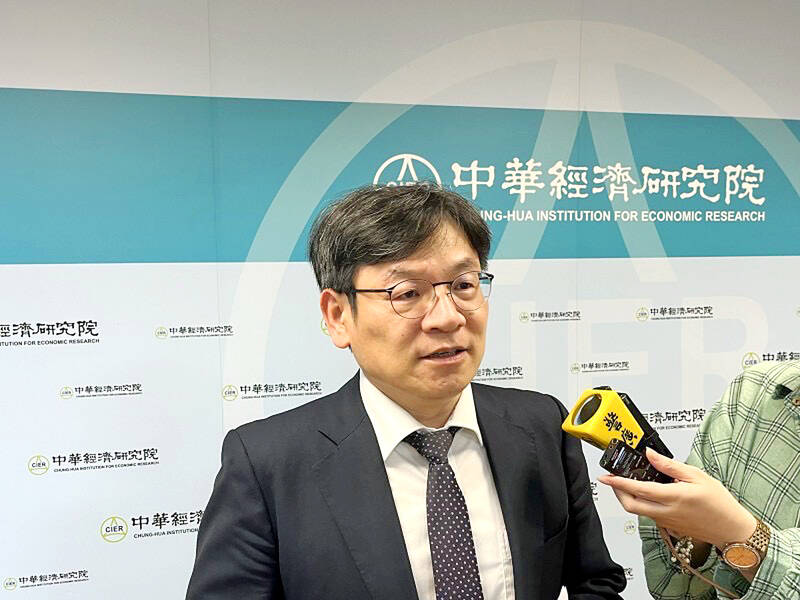Taiwan’s official manufacturing purchasing managers’ index (PMI) last month stayed unchanged at 46.8, as order visibility remained weak and inventory adjustments persisted, the Chung-Hua Institution for Economic Research (CIER, 中華經濟研究院) said yesterday.
The manufaturing PMI, which seeks to gauge the health of the manufacturing industry, suggested a minor contraction for the 10th straight month as rush orders faded and firms took stock of their businesses, CIER president Yeh Chun-hsien (葉俊顯) said.
“It is common for companies to review business toward the year-end and draw development plans for the next year,” Yeh said, adding that the landscape would become clearer after Taiwan’s presidential and legislation elections on Saturday next week and as geopolitical tensions abroad settle.

Photo: Hsu Tzu-ling, Taipei Times
PMI values larger than 50 indicate expansion, while points lower than the neutral threshold signify contraction.
Last month’s readings on new business orders, industrial production and employment showed further deterioration, while the pace of retreat was mitigated regarding inventory, delivery time and unfinished goods, the monthly survey found.
The measure on raw material prices gained 4.8 points to 53.8, which could pose a challenge to profitability unless firms can pass cost increases on to customers, CIER said.
Firms that supply basic raw materials as well as food and textile products turned neutral about order visibility and industrial output, emerging from a previously conservative sentiment, while transportation equipment vendors reported signs of restocking demand.
The timing of interest rate cuts by the US Federal Reserve and the health of China’s real-estate market have a significant influence on end-market demand, he said.
The gauge on the six-month business outlook registered 45.4, up 2.9 points from one month earlier, as a few more firms adopted optimistic views.
Firms expect business to pick up in the US, Europe and India, but remain conservative about the Chinese market, Yeh said.
Overall, firms are looking at a modest recovery in exports this year after a solid decline last year, he said.
The nonmanufacturing index fell 0.2 points to 56, as companies in the service sector continued to enjoy robust business in the post-COVID-19-pandemic era and are expecting another windfall year, the Taipei-based institute said.
Ongoing rallies on the TAIEX and the property market’s recovery, as well as forthcoming year-end banquets, are lending support to the retail, hospitality and tourism sectors, Yeh said.
Attacks in the Red Sea represent a shock to global shipping, but it is too early to pass judgement on its implications, as the situation is still unfolding, he said.
Separately, the PMI published yesterday by S&P Global showed Taiwan’s factory activity continued to decline last month, falling to 47.1 from an eight-month high of 48.3 the previous month and extending its contraction for the 19th straight month.
While Taiwan’s business confidence regarding output this year remains positive, optimism is mild overall amid concerns over customer demand, S&P Global said in a statement.

Nvidia Corp’s demand for advanced packaging from Taiwan Semiconductor Manufacturing Co (TSMC, 台積電) remains strong though the kind of technology it needs is changing, Nvidia CEO Jensen Huang (黃仁勳) said yesterday, after he was asked whether the company was cutting orders. Nvidia’s most advanced artificial intelligence (AI) chip, Blackwell, consists of multiple chips glued together using a complex chip-on-wafer-on-substrate (CoWoS) advanced packaging technology offered by TSMC, Nvidia’s main contract chipmaker. “As we move into Blackwell, we will use largely CoWoS-L. Of course, we’re still manufacturing Hopper, and Hopper will use CowoS-S. We will also transition the CoWoS-S capacity to CoWos-L,” Huang said

Nvidia Corp CEO Jensen Huang (黃仁勳) is expected to miss the inauguration of US president-elect Donald Trump on Monday, bucking a trend among high-profile US technology leaders. Huang is visiting East Asia this week, as he typically does around the time of the Lunar New Year, a person familiar with the situation said. He has never previously attended a US presidential inauguration, said the person, who asked not to be identified, because the plans have not been announced. That makes Nvidia an exception among the most valuable technology companies, most of which are sending cofounders or CEOs to the event. That includes

INDUSTRY LEADER: TSMC aims to continue outperforming the industry’s growth and makes 2025 another strong growth year, chairman and CEO C.C. Wei says Taiwan Semiconductor Manufacturing Co (TSMC, 台積電), a major chip supplier to Nvidia Corp and Apple Inc, yesterday said it aims to grow revenue by about 25 percent this year, driven by robust demand for artificial intelligence (AI) chips. That means TSMC would continue to outpace the foundry industry’s 10 percent annual growth this year based on the chipmaker’s estimate. The chipmaker expects revenue from AI-related chips to double this year, extending a three-fold increase last year. The growth would quicken over the next five years at a compound annual growth rate of 45 percent, fueled by strong demand for the high-performance computing

TARIFF TRADE-OFF: Machinery exports to China dropped after Beijing ended its tariff reductions in June, while potential new tariffs fueled ‘front-loaded’ orders to the US The nation’s machinery exports to the US amounted to US$7.19 billion last year, surpassing the US$6.86 billion to China to become the largest export destination for the local machinery industry, the Taiwan Association of Machinery Industry (TAMI, 台灣機械公會) said in a report on Jan. 10. It came as some manufacturers brought forward or “front-loaded” US-bound shipments as required by customers ahead of potential tariffs imposed by the new US administration, the association said. During his campaign, US president-elect Donald Trump threatened tariffs of as high as 60 percent on Chinese goods and 10 percent to 20 percent on imports from other countries.